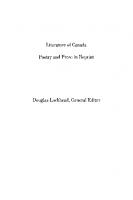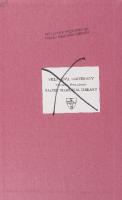The Poetical Works of Mrs. Leprohon (Miss R.E. Mullins) 9781487582982
This volume attempts to classify poems in a way which would best show the range of Mrs. Leprohon’s power, though in this
188 64 10MB
English Pages 232 [231] Year 1973
Recommend Papers

- Author / Uploaded
- Rosanna Eleanor Leprohon
File loading please wait...
Citation preview
Toronto Reprint Library of Canadian Prose and Poetry Douglas Lochhead, General Editor
This series is intended to provide for libraries a varied selection of titles of Canadian prose and poetry which have been long out-of-print. Each work is a reprint of a reliable edition, is in a contemporary library binding, and is appropriate for public circulation . The Toronto Reprint Library makes available lesser known works of popular writers and, in some cases, the only works of little known poets and prose writers. All form part of Canada's literary history; all help to provide a better knowledge of our cultural and social past. The Toronto Reprint Library is proquced in short-run editions made possible by special techniques, some of which have been developed for the series by the University of Toronto Press. This series should not be confused with Literature of Canada : Poetry and Prose in Reprint, also under the general editorship of Douglas Lochhead .
UNIVERSITY OF TORONTO PRESS
Toronto Reprint Library of Canadian Prose and Poetry
© University of Toronto Press 1973 Toronto and Buffalo Printed in Canada Reprinted in 2018
ISBN 0-8020-7523-1 ISBN 978-1-4875-8170-1 (paper)
No other edition.
'J'HE
POETICAL WORKS OF
MRS. LEPROHQN. (i\1ISS
R. E.
l\IULL1NS.)
~Uonttcnl: JOH?\ LOVELL &: SON, PUllLISHERS.
1881.
Entered according to Act of Parlbment of C:lllada, in the year one thou,and 1iight hundred aod eil(hty-one, by JoeN Lon:r.1, & S•>N., in the OJlice of th Minister of Agriculture :md Statistic:J at Ott1wa.
INTRODUCTION. Win::,, m after ages, the literature of Canada comes to he written, it is to be hoped that among the mighty sons and daughters of genius now ur,known, or as yet unborn, so:ne room will be kept for the.brave and loving pioneers who "gave the people of their best," and sang the songs of duty and patriotism and hope, ere life in our you,1g land had ceased to be 2. struggle. With the growth of wealth and the spread of prosperity, will come leisure for more than material interests; and thus, in course of time, the author who has something to say ~Jl find an audience, prepared by culture and not too busy to lister, to it. And, as supply is generally commensurate with demand, there will then be a literary class of corresponding merit. At least, something like this has been the rule in the progress of nations. But if those who come after, thus favored by circumstances, surpass their predecessors in literary skill or power, not less deserving are the latter who, with little prospect of reward, bore the burden and the heat of the day. This early stage in a nation's literature has, indeed, an interest and a value of its own, which only meet with due appreciation from a judicious and grateful posterity. If it has not the rich, warm splendor of the later morning, it has the welcome promise of the dawn, and a tender beauty of its own. In this band of pioneers Mrs. Leprohon must be conceded a
4
INTIWDl' CTlON.
distinguished place. None of them has employed rare gifts of head and heart to better purpose; noae of them lrn.d a wider range of sympa~hy ; none of them did m,xe willing service, with the purest motives, in all good causes. And, it may be added, none of them was more happy in attaiuing, during life, the admiration and friend:;hip of a large though select circle of every creed and race among her compatriots. It is in order to place in the hands of those who thus loved and honored he:- ii. memorial of what she was at her best, intellectuaily and morally, that this little volume h::ts been prepared. It contains the emotional record of a blameless and beautiful life, the m~tcome of a mind that thought no evil of any one, but over• flowed with loving kindness to all. Before pointing out, however, what we consider the salient qualities in Mrs. Leprohon's poetry, it may be well to give our readers a brief sketch of her too short career. Rosanna Eleanor Mullins was born in the city of l\fontreal in the year 1832. It is almost unnecessary to state that she was educated at the Convent of the Congregation of Notre Dame, so numerous are her affectionate tributes to the memories of dear friends associated with that institution. Long before her education was completed, she had given evidence of no c·ommon literary ability. She was, indeed, only fourteen years old when she made her earliest essays in verse and prose. Before she had bid adieu to the years and scenes of girlhood, she had already won a reputation as a writer of considerable promise, 2nd as long as :Mr. John Lovell couducted the Literary Garland, Miss Mullins was one of bis kading contributors. She
INTRODUCTION.
s
contiuued to write for that excellent magazine until lack of financial success compelled its enterprising pr6prietor to suspend its publication. It was some time before another such opportunity ,,·as gh·en to the Canadian votaries of the mu;;es of reaching the cultivated public. In the meanwhile, ho;,·ever, the subject of our sketch-who had, in 1851, become the wife of Dr. J. L. Leprohon, a member of one of the most distinguished Canadian families_;_was far from being idle. Some of her productions she sent to the Boston Pilot, the faithful representative in the United States of the land and the creed to which Mrs. Leprohon was proud to belong. She was also a frequent and "·elcomc contriuutor to sever:ll cf the Montreal journals. It is a pleasing evidence of Jier gentle thoughtfulness for a class which many persons in her position regard with indifference that she wrote, year after year, the "News-boy's Address" for the T,-ue 1-Vitness, the Daily .News and other newspapers. One of her most pathetic poems, "The Death of the Pauper Child," may also be mentioned as a striking instz.nce of that sweet charity which comprehended in its sisterly range the poor, the desolate and the suffering. The Jottmal of Education, edited by the Hon. P. J. O. Chauveau, hirnself an honor to Canadian Literature; the Canadian Illustrated .News, edited by Mr. John Lesperance, distinguished both as a poet and a. novelist; the Saturday Reader, the .H,:arthstone, and other periodicals, both in Canada and elsewhere, were always glad to number Mrs. Leprohon's productions among their most attractive features. She had always a ready pen, the result of a full heart and far-
6
I~"TRODl:CT!O!'l.
reaching sympathies, and, therefore, was frequently asked to write on subjects of current interest. Among her " occasional ·, poems, several of which are in this volume, may be mentioned the touching stanzas on the " Monument to the Irish Emigrants," those on the " Old Towers '' at the " Priest's Fann," those on the renewal of her vows by the Lady Abbess of the Congregation of Notre Dame, the poem on the " Recollet Church," and the address "To the Soldiers of Pius The Ninth." One of her most important efforts of this kind was her translation of the Cantata composed by M. Sempe on the occasion of the visit of the Prince of Wales to Canada in 1860. We have attempted such a classification of the poems as we thought would best show the range of Mrs. Leprohon's powers. Under every one of the headings which we have adopted the reader will find something to profit and delight. · Tlie lover of nature will find himself carried in fancy to the fairest or grandest of Canadian scenes; he who loves to indulge in reveries of the past can with her stand with Jacques Cartier on Mount Royal three centuries ago and survey the might;e;;:panse of forest, destined one day to be the home of a thrh·ing people; those whose pleasure it is to read of heroic deeds will hear her sing of ennobling courage and fortitude that blenched not at death. But by many, we think, Mrs. Leprohon will be most cherished as she tells in sweet and simple rhyme of the tenderness of a mother's love, of a ,\ife's devotion, a husband's loyal trust, of the pious offices of the domestic altar, of the parting by the death-bed that is not without hope, of the
l?s'TRODUCTION,
7
loved and lost that yet are " not lost but only gone before.'' To illustrate these varied characteristics by quotation would demand far more than our allotted space. We can, therefore, only refer the reader to the book itself, confident that in its p.~ges he will find all that we have indicated and much more. Just a word as to Mrs. Leprohon's prose writings. Though in this sketch we have dwelt upon her work as a poet, it is z.s a writer of fiction that she has won her most marked popular iuccesses, that she has reached the hearts of the two great :ommunities of which this province is cumposed. For no less than four of her most elaborate tales have been translated into French; these are, Ida Beresford, the Manor House of Villerai, Antoine/le de .l,firecou,-t, and Armand Durand. Besides thei.e, she has written Florence FitzHan!i11g, Eva Huntingdon, Clcrmce Fitz Clarence and Evtlccn O'Donnell. In the Afanor Hottse of Villerai she has described with a skilful pen the mauners and customs of the forefathers of the French Canadian people, such as they were at the period of the great contest l\'hich changed the destinies of Canada. In Armand Durant/ we have a courageous struggle \\ith adverse fortune, which is at last crowned with success. The sad consequences of secret marriage, unblessed by parental consent, are unfolded in Antoinette de lifirecourt, one of the finest of :Mrs. Leprohon's novels, and of which the French translation has lately been honored by a new edition. Of her merits as a novelist one of the ablest of French Canadian critics writes thus : " Gifted with a. deep knowledge of the human heart, she finds in domestic life the subject of attractive pictures, full of delicacy and good taste,
8
INTRODUCTION.
which she dramatizes with remarkable power. Her charm lies, not in any complication of intrigue or in problem;; hard to solve, but in a sl,ilful working out of details, in incidents which fix the reader's attention, in the conception of her char.:i.cters, in the painting of personal traits, in purity of thought, in sweet..'l.ess of sentiment, in beauty of style, in the harmony of the parts, and in the most scrupulous regard for morality." Thi;; is high praise, and it comes from high authority. We will simply add that, with a few necessary changes, it may also be applied to Mrs. Leprohon's poems. From this imperfect sketch of :Mrs. Leprohon's litemry life it will be seen that she was no sluggard. But we would lea,·e a wrong impression if we gave it to be understood that all her time was pa5sed in the writing of either poems or tales. Far from it. They constituted but one phase in a life nobly, yet unostentatiously, consecrated to the duties of home, of society, of charity and of religion. l\Irs. Leprohon was much more than either a poet or a ilovelist-she was, also, in the highest sense, a woman, a lady. Had she never written a verse of poetry or a page of prose, she would still have Leee lovingly remembered for what she was as wife, as mother, as friend. It is, in a great part, because they are associated with her in these more endearing aspects, that they are the true mental and moral offspring of her very self, that those who knew her will find in them so much to prize. Alas! these and loving memories, that can scarce be separated from them, are now all that is left of her. On the 20th of September, 1879, after a tedious illness, endured with Christian resignation, she passed away. She did
IN'TRODUCTJO~.
9
not live to receive the reward that was her due on earth, but that which is auo\·e is hers, and her works live after her, and a memory that will not perish. In conclusion, we will just allow ourselves to point out that, in connection with her comparatively early death, there is a touching interest attached to some of her poems, such, espe. cially, as "The Parting Soul to her Guardian Angel '' and "The Voices of the Death Chamber." In the former she says: "Thy soft-breathed hopes with magic might Have chased from my soul the shades of night. Console the dear ones I part from now, Who h:mg o'er my couch with pallid brow; Tell them, we'll meet in yon shining sky, .J\nd, Angel Guardian, I now can die." And in the latter, which has all the vividness of an actual de,tth-scene, as the husband and children from whom she must part are kneeling by the bed-side, the sufferer says : " Oh ! if earthly love could conquer The mighty power of death, His love would stay the current Of my failing strength and breath; And that voice whose loving fondness Has been my earthly stay Could half tempt me from the voices That are caliing me away." But at last they come nearer and sound louder, till they " drown all sounds of mortal birth," and " in their wild triumphal sweetness," lure her away from earth to Heaven.
SACRED POEMS.
ABRAHAM'S SACRIFICE. The noontide sun streamed brightly down Moriah's mountain crest, The golden blaze of his vivid rays Tinged sacred Jordan's breast; While towering palms and flowerets sweet, Drooped low 'neath Syria's burning heat.
In the sunny glare of the sultry air Toiled up the mountain side The Patriarch sage in stately age, And a youth in health's gay pride, Bearing in eyes and in features fair The stamp of his mother's beauty rare. She had not known when one ro!'>y dawn, Ere they started on their way, She had smoothed with care his clustering hair, And knelt with him to pray, That his father's hand and will alike Were nerved at his young heart to strike.
12
SACRED I'OE~IS.
The Heavenly Power that with such dower Of love: fills a mother's heart, Ardent and pure, that can all endure, Of her life itself a part, Knew too well that love beyond all price To ask of her such a sacrifice. Though the noble bor with laughing joy Had borne up the mountain road The altar wood, which in mournful mood His sire had helped to load, Type of Him who dragged up Calvary, The cross on which he was doomed to die, The hot breath of noon began, full soon, On his youthful frame to tell; On the ivory brow, flushed, wearied now, It laid its burning spell ; And listless-languid-he journeyed on, The smiles from his lips and bright eyes gone. Once did he say, on their toibome way, " Father, no victim is near," But with heavy sigh and tear-climmed ere, In accents sad though clear, Abraham answered : "The Lord, our guide, A fitting sacrifice will provide.'' The altar made and the fuel laid, Lo ! the victim stretched thereon Is Abraham's son, his only one, Who at morning's blushing dawn Ifad started with smiles that care defied To travel on at his father's side.
SACRED POE1IS.
With grief-struck brow the Patriarch now Bares the sharp and glittering knife ; On that mournful pyre, oh hapless sire ! 1\lust he take his darling's life? Will fails not, though his eyes are dim, God gaYe his Loy-he belongs to him. With anguish riven, he casts towards Heaven One look, imploring, wild, That doth mutely pray for strength to slay His own, his o,·tly child_; Wl1en forth on the air swells a glad c0mm1nd, And an angel stays his t,·embling hand.
The offering done, the sire and son ·come down Moriah's steep, Joy gleaming now on Abraham's bro"·, In his heart thanksgiving deep ; While with Joye from His lofty and glorious Throne Heaven's King hath smiled on sire and son.
THE STABLE OF EETHLEHEI\I. 'Twas not a palace proud and fair He chose for His first home; No dazz'ling piie of grandeur rare, \Vith pillar'd hall and dome; Oh no ! a stable, mde and poor, Received Him at His birth ; And thus was horn, unknown, obscure, The Lord of He:rven and Earth.
13
SACRED POEMS.
No band of anxious menials there, To tend the new-born chilRO NOBIS!
Iu the hour of grief and sorrow, When my heart is full of care, Seeking sadly hope to borrow From heaven's promises and prayer; When around me roll the waters Of afiliction's stcnny sea, ~fary, gentle Queen of Mercy, In that hour, oh! pray for me ! When life's pulses high are bounding With the tide of earthly joy, And when in mine ears are sounding Strains of mirth without alloy ; "'hen the whirl of giddy pleasure Le?.Yes no thought or feeling free, And I slight my heaYcnly treasure, Watchful ?llother, pray for me!
27
SACRED POE~IS.
When the soft voice of Temptation Lures my listening soul to sin, And, with baleful fascination, Strives my vain, weak heart to win; With the combat faint and weary, If I call not then on thee- · In that time of peril dreary, Tender Mother, pray for me! If, in some unguarded hour Of dark passion or of pride, Evil thoughts, with serpent power To my inmost bosom glideAh ! while I from bonds unholy, Vainly seek myself to freeMary, pure and meek and lowly, Pray, oh ! Mary, pray for me ! When with Heaven high communing In the solemn hour of prayerTo its strains my soul attuning, I forget all worldly care; When earth's voices for a season :My vex'd spirit have left freeStill, dear Mother, near me hover ! Still, sweet :Mary, pray fo1· me ! And in that supremest hour, When life's end is drawing nighWhen earth's scenes and pomps :md power Fade before my tear-dimmed eyeWhen I on the shore am lying Of eternity's '!\;de seaThen, 0 Refuge of the dying, ther, pray for me!
SACRED POEJl[S,
THE MAGDALEN AT THE MADONNA'S SHRINE. 0 :Ma,ID ELEGI.AC POiii'vl S. DIED JANUARY 26TH, 1864, THE HO~. JAMES B. CLAY, OF ASHLAi':DS, KENTUCKY, ELDEST S0i{ OF THE ILLUSTRIOl:-S H:'.::XRY CLAY. Another pang for Southern hearts, That of late so oft have bled, Another name to add to the roll Oi their mighty, p:'..triot de:'..Iother on the Birth of her First-Born Child ........... 215 To my First-Born............... • • • . . . . . • • • • . . • • . • • • . . • • • . • . • 198 To my Husband on our Wedding-Day .. ..... . . .. ....... . .... . ... 197 Voices of the Death Chamber •• • ..• • • .• •••••.•• • . • ••. .• •••••.. 222









